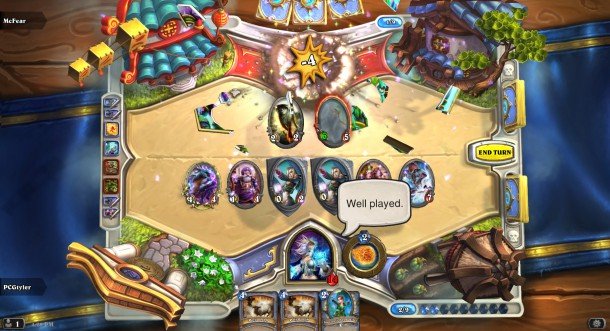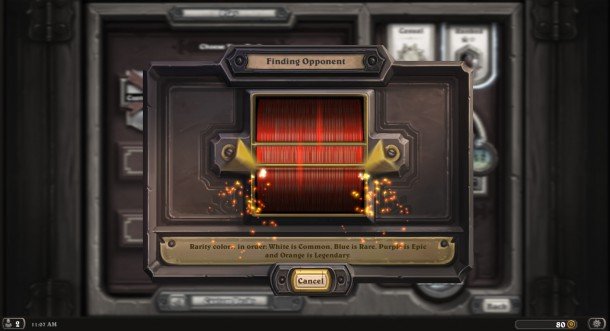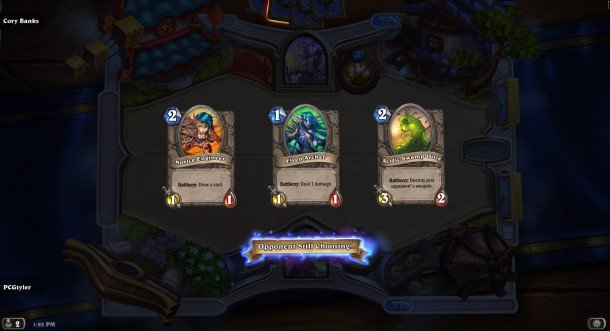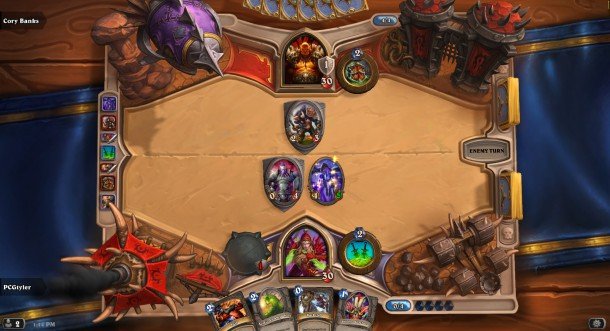How Hearthstone hooked me like video poker without bankrupting me

I'd never played a collectible card game before Hearthstone. Blackjack, poker, anything with a King and a Queen and a Jack: those are the card games I love. I've lost more money in Vegas than I care to admit—a lot of it to video poker, embarrassingly. Now I play Hearthstone. I play Hearthstone a lot. Turns out, it feeds on the exact same impulses as gambling. Thank goodness it costs less.
In video poker, I whack the “Max Bet” button—$1.25 on quarter machines—and it deals five cards. I keep the good cards and replace the others with a new deal. A good hand pays out, and I whack the button again. It's not as fun or challenging as Hearthstone, but it delivers brief highs in rapid succession: anticipating the first deal, watching the cards flip one by one to reveal my hand (flush? four of a kind?), anticipating the second deal (will I get the card I need to complete my straight?), the payout, the anticipation of the next round (this time I'll be luckier).
Hearthstone is even more layered with little highs. There's the slot machine-like wheel that builds anticipation for my next challenger (how good will they be?), the first hand I'm dealt (is it the Hearthstone equivalent of a royal flush?), each card I draw after (will it be the one I need?), each time I counter a play, and even each minion kill and every point of damage I do to my opponent. Every action accompanied by the most pleasing sounds and animations (Blizzard would do well as a slot machine designer), and then there's the payout—gold or a new pack of cards—and the opening of that pack, and the exciting new cards that inspire me to rebuild my deck and go again.

It's aggressively tempting to hit that play button for one more match, one more rush from all those moments of anticipation and the little victories that follow. Likewise, it's easy to hit the poker machine's deal button even though I should have packed it in an hour and $200 ago. Part of the problem is the gambler's fallacy: the flawed belief that if you're losing a lot, you're bound to start winning. In Hearthstone, that fallacy gets me in Arena mode, where $2 or 150 gold buys the chance to earn better and better prizes by winning as many matches as I can before three losses. Last night, I paid the 150 gold for entry, and lost all three matches straight away. I couldn't possibly lose three more in a row, right? Without enough gold to buy back in the free way, I put down $2 and very quickly lost three more in a row.
Even when I lose in Arena, I always get a new pack of cards, so it might be viewed as a fun way to buy a pack instead of a gamble. The principle, though, is the same. Slot machines give out little rewards all the time—often less than the amount of the bet—because it feels good to win something even when you're actually losing.
On an episode of the 99% Invisible podcast , Addiction by Design author Natasha Dow Schüll describes slot machine gamblers who enter “the zone.” They don't play to win, but “play to win to play,” a term she says comes from the gambling industry itself. “The idea is that gamblers want to sit there longer, and the industry has realized profit isn't really about the price of play, it's about the volume of play,” Schüll says.

I love Hearthstone's strategy and tactics, and I certainly like winning, but it's as much about entering that uninterrupted zone, where I play round after round after round in the Arena and I don't really care about the pack of cards I get at the end. If I become careless, it has the potential to be very expensive for me, and someone will likely hit that $2 spend into the Arena more times than they can afford. Someone has dumped his entire savings account into Team Fortress 2 hats . Where money can be exchanged for chance, someone will chase that high too far and be damaged by it. But Hearthstone isn't gambling. It takes advantage of the same techniques that keep slot machine players in their seats, but I don't find its monetization especially exploitative (a couple bucks for a pack of cards is reasonable, and the matchmaking feels fair and transparent), and that's why I'll keep playing.
The biggest gaming news, reviews and hardware deals
Keep up to date with the most important stories and the best deals, as picked by the PC Gamer team.
Blizzard has mastered the art of habit-forming gameplay, and I'm enjoying my Hearthstone habit. It's nice to lose control sometimes, to stay up until three in the morning playing a game I just can't quit, as I've done over and over with Civilization. But it's too simple to say that I play Hearthstone because it's “fun.” I'm hooked on it. It may be a passing fascination, no more damaging than if I were a regular bridge player, but it's more than "fun" that keeps me up late fiddling with my Rogue deck.

Whether they're free-to-play or not, we allow games to manipulate our reality. That's not a criticism—it's what they do by nature—but it's necessary to pull back sometimes and make sure we know what we're giving them permission to do. I have a lot of fun in Hearthstone, but I'm also giving it permission to mix that fun with a state of compulsive play where I'm barraged with extrinsic rewards and all the same little highs I get from gambling.
The next time you're up at 2 a.m. playing a game, or you're about to buy a new Hearthstone deck or Team Fortress 2 key, I recommend doing the same: think about what you're doing and permit the game play its role in convincing you to do it. For me, the act prevents buyer's remorse and helps me stay healthy with my gaming. It's the reason I uninstalled Threes on my iPhone when I found I was playing it more as a tic than a source of fun. And if Hearthstone ever stops being fun, I'll uninstall it, too. I don't feel bad about spending a few dollars to be entertained, but I need to be sure that I'm buying entertainment, and not hitting “Max Bet.”

Tyler grew up in Silicon Valley during the '80s and '90s, playing games like Zork and Arkanoid on early PCs. He was later captivated by Myst, SimCity, Civilization, Command & Conquer, all the shooters they call "boomer shooters" now, and PS1 classic Bushido Blade (that's right: he had Bleem!). Tyler joined PC Gamer in 2011, and today he's focused on the site's news coverage. His hobbies include amateur boxing and adding to his 1,200-plus hours in Rocket League.

